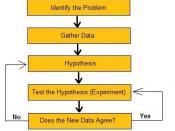Just as a scientist conducts researches or experiments in order to arrive with a conclusion, ordinary people also go through some processes, some evaluation or comparison for example, before coming up with a choice or decision.
Earlier we have referred to or defined science as a body of knowledge, a "rational inquiry into nature." Our practice of science begins with this definition and goes on with philosophical discussions - concepts of a "scientific world view", scientific paradigms, anomalies, and scientific revolutions. But perhaps central to the practice of science are "methods of science" and the values that these and science itself imparts us. These two aspects are useful and actually applicable to the real or "nonscientific world".
We have always been familiar with the scientific method. Definition of the problem, hypothesis, observation, and so on. A closer look at these and how scientists have applied them in actual practice would however give us some new points to consider.
For one, there are such things as unstructured experiments. We have been accustomed with step-by-step experiments, those that strictly follow some sort of chronology. This however is not really the case since it cannot be helped for an experiment to actually cover more than one problem (and thus lead to several if not unintended discoveries or conclusions). Further and as the Philosopher of Science Paul Fayerabend suggests with his "Against Method", there really is no (particular) method, as prescribed "official" methods would unduly hold back scientific progress. Another point is that dreams, imaginations, or lucky guesses can actually play important roles in scientific researches and experiments.
And then there is also the concept of peer reviews among scientists and experimentalists. Via this peer review scientists are able to scrutinize (or check, in simpler terms) one another's work, thus ensuring the quality and...


